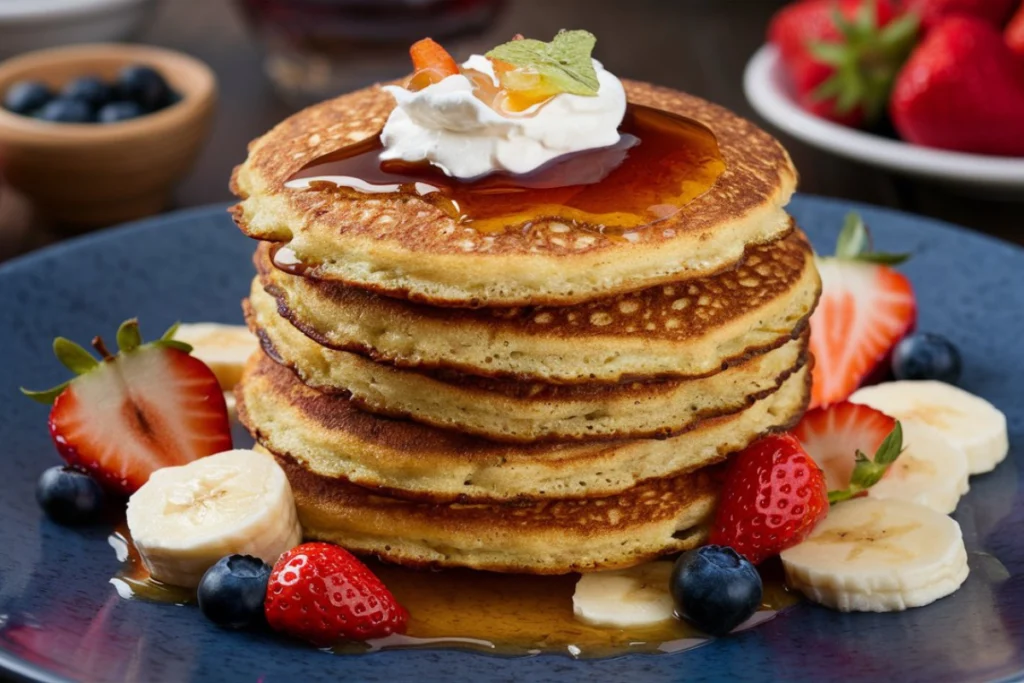
Introduction to Buckwheat Cakes
Introduction to Buckwheat Cakes
Buckwheat cakes are becoming a favorite among health enthusiasts and those looking for gluten-free alternatives. But what makes them stand out? In this section, we’ll explore the origins and unique characteristics of buckwheat cakes, setting the stage for a deeper dive into their nutritional benefits.
History and Origin of Buckwheat
Buckwheat has a rich history that dates back thousands of years. Originating in Southeast Asia, it spread to Europe and Russia, where it became a staple in many traditional dishes. Despite its name, buckwheat isn’t a grain but a seed, making it suitable for those with gluten sensitivities. Buckwheat’s robust flavor and versatility in cooking have made it a beloved ingredient in many cultures.
What are Buckwheat Cakes?
Buckwheat cakes are a delightful fusion of buckwheat flour and other nutritious ingredients. Unlike traditional cakes, which often rely on refined wheat flour, buckwheat cakes boast a denser texture and a unique, earthy flavor. They can be enjoyed in various forms, from simple pancakes to elaborate layered cakes, and are often paired with fruits, nuts, and natural sweeteners.
What are Buckwheat Cakes?
History and Origin of Buckwheat
Despite its misleading name, buckwheat shares no relation to wheat. It’s a seed from the Fagopyrum esculentum plant and has been cultivated for over 8,000 years. Originating in Southeast Asia, it spread across Europe and Russia, becoming a dietary staple due to its adaptability to poor soil conditions and cool climates. Traditional dishes like Japanese soba noodles, Russian blini, and European kasha have long celebrated buckwheat for its unique flavor and nutritional benefits.
What are Buckwheat Cakes?
So, what exactly are buckwheat cakes? Simply put, they are cakes made primarily with buckwheat flour, offering a distinct alternative to those made with conventional wheat flour. The cakes have a dense texture and a nutty, earthy flavor that sets them apart. From pancakes to more complex layered cakes, buckwheat provides a versatile base that’s perfect for various recipes.
Types of Buckwheat Cakes
Buckwheat cakes come in many forms:
- Pancakes and Crepes: Light and fluffy, these are a breakfast favorite.
- Muffins and Quick Bread: Ideal for a nutritious snack or breakfast on the go.
- Layered Cakes: Perfect for special occasions, these can be dressed up with fruits, nuts, and natural sweeteners.
Buckwheat’s versatility doesn’t stop at cakes. It’s also used in noodles, crackers, and even granola, making it a powerhouse ingredient in both savory and sweet dishes. Its adaptability and health benefits have made it a popular choice for those looking to improve their diet without sacrificing taste.
Nutritional Profile of Buckwheat Cakes
Understanding the nutritional profile of buckwheat cakes can help you appreciate their health benefits and decide whether they deserve a place in your diet. Buckwheat is not only versatile but also packed with essential nutrients that contribute to overall well-being.
Macronutrients in Buckwheat
Protein Content
Buckwheat is a powerhouse when it comes to protein. Unlike many plant-based foods, buckwheat contains all nine essential amino acids, making it a complete protein source. One cup of cooked buckwheat groats provides approximately 6 grams of protein, which is beneficial for muscle repair and growth.
Carbohydrates and Fiber
Buckwheat cakes are rich in complex carbohydrates, which provide sustained energy. The substantial fiber content supports healthy digestion and helps regulate blood sugar levels. A serving of buckwheat contains about 6 grams of dietary fiber, which is essential for digestive health and preventing constipation.
Micronutrients in Buckwheat
Vitamins
Buckwheat is an excellent source of B vitamins, particularly niacin (B3) and riboflavin (B2), which are crucial for energy production and overall metabolic health. These vitamins help convert food into energy and play a significant role in maintaining healthy skin and neurological functions.
Minerals
Buckwheat is loaded with essential minerals such as magnesium, phosphorus, zinc, copper, and manganese. Magnesium helps with muscle function, phosphorus is vital for bone health, and zinc supports the immune system. Copper aids in iron absorption, while manganese is important for metabolism and bone formation.
Health Benefits of Buckwheat Cakes
Digestive Health
The high fiber content in buckwheat cakes promotes healthy digestion. Insoluble fiber adds bulk to stool, helping to prevent constipation and lower the risk of digestive disorders like diverticulitis.
Cardiovascular Benefits
Buckwheat is known for its heart-healthy properties. Regular consumption can help reduce cholesterol levels and lower blood pressure. The presence of rutin, a powerful antioxidant, enhances blood vessel strength and circulation, further supporting cardiovascular health.
Blood Sugar Control
With a low glycemic index, buckwheat helps manage blood sugar levels, making it an excellent choice for people with diabetes. The complex carbohydrates in buckwheat break down slowly, preventing spikes in blood sugar and providing steady energy.
Gluten-Free Benefits
Buckwheat is naturally gluten-free, making it suitable for those with celiac disease or gluten sensitivities. It’s a fantastic alternative to traditional wheat-based products and can be enjoyed without the digestive issues associated with gluten.
Health Benefits of Buckwheat Cakes
Digestive Health
Buckwheat cakes are a boon for digestive health, primarily due to their high fiber content. Insoluble fiber, which is abundant in buckwheat, helps to add bulk to stool and promotes regular bowel movements. This type of fiber is crucial for preventing constipation and can also lower the risk of developing diverticulitis, a painful condition affecting the large intestine. By including buckwheat cakes in your diet, you’re supporting a healthy digestive system and reducing the likelihood of gastrointestinal issues.
Cardiovascular Benefits
One of the standout health benefits of buckwheat cakes is their positive impact on cardiovascular health. Regular consumption of buckwheat can help reduce cholesterol levels and improve heart health. The presence of rutin, an antioxidant found in buckwheat, strengthens blood vessels and enhances circulation, thereby reducing the risk of heart disease. Studies have shown that buckwheat intake can lower total cholesterol and triglycerides, contributing to better overall heart health.
Blood Sugar Control
For those concerned about blood sugar levels, buckwheat cakes offer a significant advantage. Buckwheat has a low glycemic index, meaning it releases glucose into the bloodstream slowly, preventing spikes in blood sugar levels. This makes it an excellent choice for individuals with diabetes or those looking to manage their blood sugar levels effectively. The complex carbohydrates in buckwheat break down gradually, providing steady energy without causing sharp increases in blood sugar.
Gluten-Free Benefits
Buckwheat is naturally gluten-free, making it a perfect alternative for people with celiac disease or gluten sensitivity. Unlike wheat-based products, buckwheat can be enjoyed without triggering adverse reactions related to gluten. This makes buckwheat cakes a safe and delicious option for those who need to follow a gluten-free diet. Moreover, the nutritional benefits of buckwheat make it a superior choice compared to many other gluten-free grains.
Additional Health Benefits
Anti-inflammatory Properties
Buckwheat contains several compounds with anti-inflammatory properties, such as quercetin and rutin. These compounds help reduce inflammation in the body, which is a contributing factor to many chronic diseases. By incorporating buckwheat cakes into your diet, you may benefit from reduced inflammation and improved overall health.
Weight Management
Thanks to their high fiber content and low glycemic index, buckwheat cakes can aid in weight management. Fiber prolongs the feeling of fullness, making it less likely that you’ll overeat. Additionally, the slow release of carbohydrates provides sustained energy, helping to curb cravings and maintain a healthy weight.
Rich in Antioxidants
Buckwheat is packed with antioxidants that help protect your cells from damage caused by free radicals. These antioxidants, including flavonoids like quercetin and rutin, support overall health and may reduce the risk of chronic diseases.
Potential Concerns and Considerations
Allergies and Sensitivities
While buckwheat is generally considered safe for most people, it is important to note that some individuals may be allergic to it. Buckwheat allergy, though rare, can cause severe reactions such as hives, swelling of the tongue and lips, and difficulty breathing. If you’re trying buckwheat for the first time, it’s wise to do so cautiously. Be mindful of any allergic reactions and seek medical help immediately if symptoms occur.
Considerations for Diet and Health
Caloric Content and Weight Management
While buckwheat cakes have many health benefits, consuming them in large quantities can still lead to weight gain due to their caloric content. Include them in your diet in moderation to maintain balance and health. Incorporating a variety of whole foods alongside buckwheat cakes can ensure that you’re getting a diverse range of nutrients without overloading on calories.
Balanced Nutrient Intake
While buckwheat is nutrient-dense, it should not be the sole focus of your diet. A balanced diet includes a variety of fruits, vegetables, proteins, and whole grains. Buckwheat cakes can be a healthy addition, but it’s crucial to pair them with other nutritious foods to meet your overall dietary needs. This helps ensure that you receive a full spectrum of vitamins, minerals, and other essential nutrients.
Other Considerations
Quality and Processing
The nutritional value of buckwheat cakes can vary depending on how they are prepared. Highly processed buckwheat products may contain added sugars, preservatives, and sodium, which can negate some of the health benefits. When choosing buckwheat products, opt for those with minimal processing and natural ingredients. Homemade buckwheat cakes, where you control the ingredients, are often the best choice for maximizing health benefits.
Interactions with Medications
If you are on medication, especially blood thinners, consult your healthcare provider before increasing your intake of buckwheat. The high rutin content in buckwheat can interact with blood-thinning medications, potentially affecting their efficacy. Always seek professional medical advice to ensure that dietary changes do not interfere with your medication regimen.
Environmental Considerations
Buckwheat is a sustainable crop that can grow in poor soil conditions and requires fewer pesticides than other grains. By choosing buckwheat products, you’re also making an environmentally friendly choice. Supporting sustainable agriculture helps reduce the overall environmental impact of food production.
How to Incorporate Buckwheat Cakes into Your Diet
Recipes and Cooking Tips
Incorporating buckwheat cakes into your diet is easier than you might think. Here are some delicious and nutritious recipes to get you started, along with cooking tips to ensure your buckwheat cakes turn out perfectly every time.
Basic Buckwheat Cake Recipe
This simple recipe is a great starting point and can be easily customized to suit your taste.
Ingredients:
- 1 cup buckwheat flour
- 1/2 cup almond flour
- 1/2 cup rolled oats, chopped
- 1 tablespoon flaxseed meal
- 2 1/2 teaspoons baking powder
- 1/4 teaspoon baking soda
- 1/4 teaspoon sea salt
- 3/4 cup unsweetened almond milk
- 1 teaspoon apple cider vinegar
- 1/4 cup maple syrup
- 2 teaspoons vanilla extract
- 2 tablespoons almond butter
- 1/3 cup unsweetened applesauce
Instructions:
- Preheat your oven to 350°F (175°C). Line a baking pan with parchment paper.
- Mix the almond milk and apple cider vinegar in a bowl, then set it aside.
- Combine the dry ingredients in a large bowl.
- Add the wet ingredients to the almond milk mixture and stir.
- Mix the wet ingredients with the dry ingredients until well combined.
- Pour the batter into the prepared pan and spread it evenly across the surface.
- Bake for 20-25 minutes, checking until a toothpick inserted in the center emerges clean.
- Allow the cake to cool before serving.
Variations and Serving Suggestions
Vegan Buckwheat Pancakes
For a vegan twist, you can use buckwheat flour to make pancakes. Combine buckwheat flour with plant-based milk, a flax egg (flaxseed meal mixed with water), and a touch of baking powder. Top with fresh fruits and a drizzle of maple syrup for a delightful breakfast.
Chocolate Buckwheat Cake
For a more indulgent treat, add cocoa powder and dark chocolate chips to your buckwheat cake batter. This makes for a rich, gluten-free dessert that’s perfect for special occasions.
Savory Buckwheat Cakes
Buckwheat isn’t just for sweet dishes. You can make savory buckwheat cakes by adding ingredients like shredded zucchini, chopped herbs, and spices. These savory cakes can be served as a side dish or a light meal.
Pairing and Serving Suggestions
Buckwheat cakes are incredibly versatile and pair well with a variety of toppings and sides:
- Fresh Fruits: Top your cakes with berries, bananas, or apples for a burst of natural sweetness.
- Nuts and Seeds: Add a sprinkle of nuts or seeds for extra crunch and nutrition.
- Natural Sweeteners: Drizzle with honey or maple syrup for added sweetness.
- Dairy-Free Yogurt: Serve with a dollop of coconut or almond yogurt for a creamy contrast.
Tips for Cooking with Buckwheat Flour
- Mix with Other Flours: While buckwheat flour can be used alone, mixing it with other gluten-free flours like almond or oat flour can improve texture and flavor.
- Use Binding Agents: Buckwheat flour lacks gluten, so adding binding agents like flaxseed meal or chia seeds can help hold your cakes together.
- Don’t Overmix: Overmixing the batter can make the cakes dense. Mix until just combined for the best texture.
Conclusion
Buckwheat cakes are not only delicious but also packed with numerous health benefits. As a gluten-free alternative to traditional cakes, they offer a rich source of protein, essential vitamins, and minerals. These cakes can improve digestive health, support cardiovascular wellness, help manage blood sugar levels, and provide a viable option for those with gluten sensitivities.
Incorporating buckwheat cakes into your diet is easy and versatile. Whether you prefer sweet or savory dishes, there’s a buckwheat recipe to suit your taste. From basic cakes and pancakes to more elaborate creations, buckwheat flour provides a nutritious base for a variety of meals.
Despite their benefits, it’s important to consume buckwheat cakes in moderation and as part of a balanced diet. Be mindful of potential allergies and choose minimally processed products to maximize their health advantages.
Overall, buckwheat cakes are a worthy addition to a healthy diet. They combine great taste with impressive nutritional value, making them an excellent choice for those looking to improve their dietary habits. So why not give buckwheat cakes a try? You might find that they become a favorite part of your culinary repertoire.
FAQs
Are Buckwheat Pancakes Healthier than Regular Pancakes?
Yes, buckwheat pancakes are generally considered healthier than regular pancakes made from refined wheat flour. Here are a few reasons why:
- Nutritional Content: Buckwheat is rich in protein, fiber, and essential minerals such as magnesium, phosphorus, and manganese. It also contains antioxidants like rutin and quercetin, which have anti-inflammatory properties.
- Gluten-Free: Buckwheat is naturally gluten-free, making it a suitable option for people with celiac disease or gluten sensitivities.
- Low Glycemic Index: Buckwheat has a lower glycemic index compared to regular wheat, meaning it causes a slower rise in blood sugar levels, which is beneficial for diabetes management.
Are Buckwheat Rice Cakes Healthy?
Buckwheat rice cakes can be a healthy snack option, particularly when compared to traditional rice cakes. Here’s why:
- Higher Nutrient Density: Buckwheat rice cakes often contain more protein and fiber than plain rice cakes, which can help keep you fuller for longer and support digestive health.
- Rich in Minerals: They are a good source of minerals like magnesium, copper, and manganese, contributing to various bodily functions including bone health and metabolism.
- Gluten-Free: As with other buckwheat products, these rice cakes are suitable for those avoiding gluten.
What are the Pros and Cons of Buckwheat?
Pros:
- Abundant in vital nutrients such as protein, fiber, and essential vitamins and minerals.
- Free from gluten, making it appropriate for individuals with celiac disease or gluten intolerance.
- Heart Health: Can help lower cholesterol and blood pressure.
- Blood Sugar Control: Low glycemic index, making it good for managing diabetes.
Cons:
- Allergy Potential: Although rare, some people may be allergic to buckwheat, which can cause severe reactions.
- Caloric Content: Like any food, consuming large amounts can contribute to weight gain if not balanced within a healthy diet.
Is it Safe to Eat Buckwheat Every Day?
Yes, it is generally safe to eat buckwheat every day, provided it is part of a balanced diet. Daily consumption can offer numerous health benefits, such as improved digestion, better blood sugar control, and enhanced heart health. However, it’s essential to consider the following:
- Variety in Diet: Eating a variety of foods ensures you get a wide range of nutrients. Relying solely on buckwheat may lead to nutritional imbalances.
- Allergies: As with any food, be aware of potential allergies. If you encounter any negative responses, cease usage and seek advice from a healthcare professional.
- Balanced Nutrient Intake: While buckwheat is nutrient-dense, ensure it complements other healthy foods like fruits, vegetables, lean proteins, and healthy fats.

